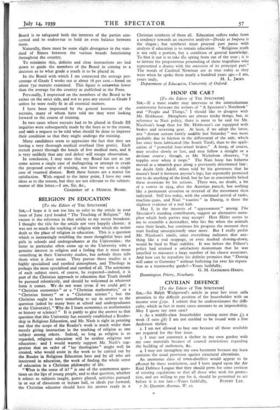RELIGION IN EDUCATION
[To the Editor of THE SPECTATOR]
SIR,—I hope it is not too late to refer to the article in your issue of June 23rd headed " The Teaching of Religion." My excuse is the reference in that article to my recent broadcast.
I thought the title for the article not very happily chosen : it was not so much the teaching of religion with which the writer dealt as the place of religion in education. This is a question which is increasingly troubling the more thoughtful boys and girls in schools and undergraduates at the Universities : the latter in particular often come up to the University with a genuine interest in religion and a feeling that it must mean something in their University studies, but nobody there tells them what it does mean. They pursue those studies in a highly specialised and rarefied atmosphere, and Theology in perhaps the most specialised and rarefied of all. The autonomy of each subject must, of course, be respected—indeed, it is part of the Christian approach to education that Truth should be pursued relentlessly, and should be welcomed in whatever form it comes. We do not want (even if we could get) a " Christian economics " or a " Christian mathematics," or a " Christian history " or a " Christian science " ; but the Christian ought to have something to say in answer to the question (asked by many boys at school and undergraduates at the University), " Why do I learn economics or mathematics or history or science? " It is partly to give the answer to that question that this University has recently established a Reader- ship in Religious Education, and Mr. Nash is right in pointing out that the scope of the Reader's work is much wider than merely giving instruction in the teaching of religion as one subject among others. Indeed, so long as religion is so regarded, religious education will be neither religious nor education : and I would warmly support Mr. Nash's sug- gestion that an order of " lay theologians " might well be created, who would assist in the work to be carried out by the Reader in Religious Education here and by all who are interested in education, the work of finding the whole sense of education in a Christian philosophy of life.
" What is the sense of it? " is one of the commonest ques- tions on the lips of young people, and to that question, whether it relates to subjects taught, games played, activities pursued in or out of classroom or lecture hall, or ideals put forward, the Christian educator should have his answer ready in a
Christian synthesis of them all. Education suffers today from a tendency towards an excessive analysis—Divide et Impera is the slogan ; but synthesis must proceed pari passu with analysis if education is to remain education. " Religious truth is not only a portion, but a condition of general knowledge. To blot it out is to take the spring from out of the year ; it is to imitate the preposterous proceeding of those tragedians who represented a drama with the omission of its principal part." The words of Cardinal Newman are as true today as they were when he spoke them nearly a hundred years ago.—I am,










































 Previous page
Previous page